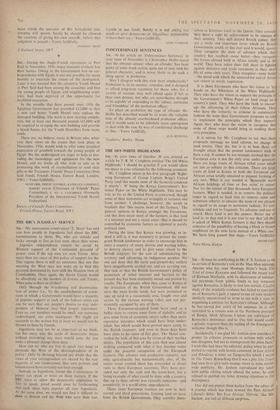THE OFF-WHITE HIGHLANDS
Sta.- -In your issue of October 30 you printed an article by T. R. M. Creighton entitled 'The Off-White Highlands.' I should be grateful if you would allow me space in your columns for the following comment.
Mr. Creighton states in his first paragraph 'Right- wing Europeans of Group Captain Brigg's United Party (and this means most of the farmers) condemn it utterly': 'it' being the Kenya Government's Ses-' sional Paper on the White Highlands. This may be true so far as the United Party is concerned, though some of their statements are strangely at variance one from another. I challenge, however, the words in brackets that 'this means most of the `farmers.' The general opinion in Kenya amongst the Europeans, and this does mean most of the farmers, is that land is a national and not a racial asset—that it should be controllod by economic factors as opposed to purely political ones. • • During. the time that Kenya was growing, as in- deed it still is, it was necessary to protect the immi- grant British landowner in order to encourage him to enter a country of many diverse and warring tribes, to destroy slavery and to give some return to the British taxpayer for the cost of administering the territory and advancing its indigenous peoples. No one can deny that the early and present-day settlers have magnificently carried out, and are carrying out, that task or that the British Government's policy of protection of tribal interests and harriers to the present day has been eminently sound and proven by results. The Europeans. when they came to Kenya at the invitation of the British Government. did not seize the most fertile lands, but were permitted to take up land in a vacuumatic area, fought over and across by the various warring tribes and not per- manently occupied by any of them.
These European-occupied lands 'were used as a buffer state to restore some. form of stability and to give some form of economic return rathet than more repressive measures which could have been under- taken, but which would have proved more costly to the British taxpayer, and even - in, those days have been alien to his sense of fair play. The Masai con- trolled the bulk of this area by virtue of their warlike ability. The population of this area then Was almost nothing compared with what it has become today under the peaceful occupation of the European farmers. The advance and productive capacity, not . only agriculturally but humanistically also, of the native areas around them has proceeded in direct ratio to these European successes. They have pro- vided not only the cash and the know-how, but a living example of what could be done with a country that up to their advent was virtually unknown—and completely, in a world sense, unproductive.
Those same. European farmers. are now -in their second and third generations, farming land on lease from the British. Government. They consider them- selves as Kenyans loyal to the Queen. They consider they have a right by achievement to be citizens of their country. They still defend British justice: they are a virile and important force which no British Government could, or has ever said it would, ignore. They recognise the state of advance which their country has reached—none better—they recognise the forces abroad both in Africa totally and in the world. They have taken their full share in fighting against dictators and trade recessions in their short life of some sixty years. They recognise—none better —the speed with which the uncared-for soil of Africa can return to sterile vegetation.
It is these Europeans who have the vision to 'la hands on the Whiteness of the White 'Highlands They who have the vision to support the principle of the Government's White Paper on land usage as country's asset. They who have the faith to encour age the advancing of their fellow Africans. The who have the temerity to criticise in constrfictive fashion the steps their Government proposes to take to implement the principles which they support. Again they who have the vision to recognise that sonic of those steps would bring to nothing those very principles.
It is untrue for Mr. Creighton to say that these proposals envisage no land reform, no change irl land tenure. They do; but it is in how these are brought about that the present landowners wish to have a say. It cannot be too strongly stressed that the European arta is not the only area under question; there are large tracts of. African tribal areas which are just as subject to this criticism. There are large tracts of land in Kenya in both the European and African areas totally unsuited to peasant farming of any sort. What is not needed is 'thousands more African holdings of four or five acres' in extent. Nor for the matter of that thousands more European farmers. What is needed, is to remove the political issues in regard to land (not ,to remove some and substitute others); to educate the mass of our citizens in regard to its usage in economic fashion. To con solidate and not to fragment. To advance and not to retard. More land is not the answer. Better use of land is; to that end it is not true to say that 'all that is asked of White Kenya farmers is that they should conceive of the possibility of having a black or brown neighbour on the next farm instead of a White one. We have long passed that stage.—Yours faithfully.
a






































































 Previous page
Previous page